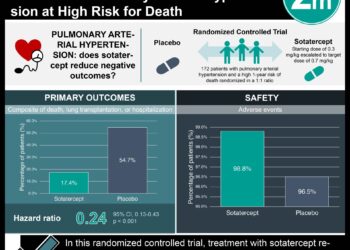Triple combination antihypertension therapy improves blood pressure control for mild-to-moderate hypertension
1. In this randomized controlled trial, patients receiving triple combination antihypertension therapy (TCAT) were more likely to achieve their blood pressure target compared to those with usual care at 6 months.
2. There were no significant differences in the number of patients who withdrew from the study due to adverse events.
Evidence Rating Level: 1 (Excellent)
Study rundown: Hypertension is a global health problem and remains one of the leading causes of mortality. With multiple pharmacological methods to control hypertension, pills are now produced to contain multiple complementary drugs thus improving medication adherence due to simplification. In the TRIUMPH trial, participants randomized to Triple Combination Antihypertensive Therapy (TCAT) received a pill containing an angiotensin receptor blocker, a calcium channel blocker, and a thiazide diuretic and were compared to those receiving care as usual. The participants who received TCAT had quicker blood pressure control at 6 weeks and were more likely to have achieved their blood pressure target at 6 months compared to the those with usual care. In addition, the adverse effect rates were similar for both groups, and there was no difference in the number of patients that withdrew due to adverse events. Both arms of the trial had good retention of participants at 6 months, and they had no differences in self-reported medication adherence.
While the strong study design does suggest that TCAT may be superior to other methods in terms of lowering blood pressure, some considerations should be noted. Most notably, this study took place in Sri Lanka where medications are provided to patients free of charge, and this is not the case in countries with private insurance systems where TCAT may initially be more expensive. Thus, the generalizability of these results may be limited to countries with similar health care systems, and further research will be needed to determine if TCAT leads to better outcomes with appropriate considerations of cost.
Click to read the study in JAMA
Relevant reading: Combination therapy is superior to sequential monotherapy for the initial treatment of hypertension: A double-blind randomized controlled trial
In-depth [randomized controlled trial]: The Triple Pill vs Usual Management for Patients with Mild-to-Moderate Hypertension (TRIUMPH) was a randomized, multi-institutional, open-label, pragmatic trial which randomized 700 participants that were recruited between February 15, 2016 and May 3, 2017 with follow-up through October 24, 2017. 349 participants were randomized to receive TCAT and 351 were randomized to receive usual care. The TCAT pill consisted of 20 mg of telmisartan, 2.5 mg of amlodipine, and 12.5 mg of chlorthalidone. The primary outcome was measured as the proportion of participants who achieved targeted blood pressure at 6 months defined as 140/90 mmHg and 130/80 mmHg for those with co-morbidities. Patients were excluded if they were currently using 2 or more medications to lower their blood pressure, had severe or uncontrolled blood pressure (>180/110 mmHg), or were already taking a triple combination pill. After 6 months of follow-up, 69.5% of participants in the TCAT group achieved their blood pressure target as compared to 55.3% in the usual care group (adjusted RR 1.23; CI95 1.09 to 1.39). In addition, a greater proportion of TCAT participants achieved their targeted blood pressure at 6 weeks (67.8% vs 43.6%; RR 1.53; CI95 1.33 to 1.76) and 12 weeks (72.6% vs 47.4%; RR 1.51; CI95 1.32 to 1.72) when compared to the usual care group. Overall mean systolic and diastolic blood pressure measurements at 6 months were significantly lower in the TCAT group when compared to the usual care group (Systolic -9.8; CI95 -11.6 to -7.9 mmHg; Diastolic -5.0; CI95 -6.1 to -3.9 mmHg). There was no significant difference in self-reported medication adherence between the two groups (95.0% vs. 94.6%; p = 0.82). Finally, there was no significant difference in the proportion of participations who discontinued their blood pressure medication due to an adverse event (6.6% vs. 6.8%; p = 0.92).
Image: PD
©2018 2 Minute Medicine, Inc. All rights reserved. No works may be reproduced without expressed written consent from 2 Minute Medicine, Inc. Inquire about licensing here. No article should be construed as medical advice and is not intended as such by the authors or by 2 Minute Medicine, Inc.





